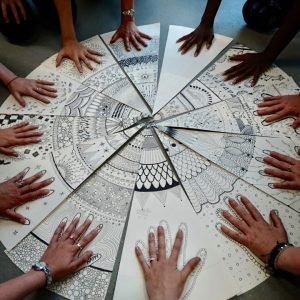Cultivating Purity of Mind
merging into deep union
From both an individual and collective perspective, communitarians consider habits of inner and outer cleanliness, the identifying characteristics of those living by evolved social, economic and ecological principles and practices. For these reasons, those committed to progressively aligning their lifestyle and love-style with communal union – sharing all with all, factor time, energy and processes into their daily schedules to ensure the maintenance and improvement of both inner and outer purity.

walking the path toward deep union
It is to be understood that ‘self-love’ is the foundation of ‘communal love’, which is the heart and soul of assimilation into common purse communal unions that derive sustainable economic support from ‘common wealth’ Right Livelihood provisioning cooperatives.
Integrating into ‘deep union’ begins with the recognition that little if any personal or social progression will ever come of cleaning the outer while the inner remains languishing in less-than-ideal conditions. On the journey toward merging our innate separateness into communal living and loving, it is imperative that those drawn toward living within unions born of evolved relational expression, develop the skills to identify and heal, the mental disturbances and deficiencies that manifest as emotional irritability and instability; anti-social and chaotic behaviour; depression and anxiety; aggression and timidity, along with overcoming all kinds of irrational phobias.
The mind, like a house, garden or workplace can only be and remain as clean and functional as those using the facilities. And so it follows, the principle and practice of ‘Love-In-Action’ must prevail in regards to both protecting and nourishing the mind from morning to night. Successful transition to sharing our everyday lives with many, also necessitates that those drawn to evolved relating, develop resilience and maturity through cultivating habits of mental cleanliness which includes diligently guarding against pollutions and corruptions, such as pornography, negative projections and mental ruminations, pride and indulgence in hollow glamour that include all forms of vanity, self-promotion and egotism.
Utilizing the daily Observances to evolve purity of mind
Through determination to cultivate conditions conducive to achieving and maintaining purity and maturity of mind, communitarians adopt the principles and practices of ‘Personal Progression’ as an aid to perfecting thought, word and deed. To fulfil this objective, it is common practice for those aligned with communitarian principles and practices to cease from labour and other activities to reflect upon their state of mind at seven points throughout the day and evening.
The central purpose of the daily Observances is to provide opportunities for communitarians to recognise, address and resolve deviations from, and impediments to, maintaining inner and outer peace and harmony with fellow communitarians who walk alongside us on the path to creating a better world for current and future generations.
It is for these reasons that communitarians make the consistent effort to rise the hour before dawn, observe sunrise, cease from labours mid-morning, high-noon, mid-afternoon, at sunset, and again when the moon and stars appear in the night sky, to set aside a few minutes to align the mind with the principles and practices of communitarian union which opens the path as we walk it to the promised era of perpetual peace through sharing all with all.
Choosing the Higher over the lower
As with the path to inner peace, inner purity likewise is progressively acquired via continuously choosing the pure over the impure – the ethical over the unethical; the unselfish over the selfish; and forgiveness over harbouring hatred and resentment… and on and on it goes. Always and forever, discernment is employed to determine evolved principles and practices – deciding what would be better; and when we get there, we must elect to enact what would be better still.
Another point to consider is that the path to inner purity requires also as much ‘not doing’ as it does ‘doing’. As an example; it means turning off TV programs and YouTube Videos that corrupt our minds with scenes and scripts portraying gratuitous violence, greed, glamour, lewdness or other kinds of harmful and destructive vices. It means not engaging in gossip, or allowing ourselves to be drawn into arguments and conflicts that are fundamentally power trips, or else wasteful distractions from devoting our time and energy to worthwhile enduring missions and productive personal, communal and wider world pursuits that better conditions for people, animals and planet.
The striving towards inner purity is not just a better way to be human. In fact, the path to cleanliness of mind, requires that we travel in the opposite direction; prepared to become less human – less animal, less instinctive and more motivated to evolve toward newer versions of ourselves – to extend, to overcome through claiming time and space to think, to feel, to wonder, to imagine; and ultimately, experiment with clothing ourselves with new garments of psychological exploration and expression.
Personal and social progression towards inner purity requires a conscious effort to push beyond accepting human traits and character flaws as ‘par for the course’. It necessitates knowledge, choice and effort to leave behind and rise above the primitive lower draws enmeshed with the unconsciously cycled and passed-down inherited and conditioned, psyche.
Through personal study and also participation in group ‘Gestalt Provings’, communitarians make significant progress toward cultivating new and improved character traits that go along way to helping them escape from the prison of norms that see us unconsciously repeating patterns and programming that serves no one – not society, nor the environment.
discerning wise association
The tenets of ‘One Cloak’ are made manifest through the determination of communitarians to develop and maintain a moral character through personal effort as well as modelling the character and behaviours of those demonstrating consistent evolved ethical thought, word and deeds. It is for these reasons that communitarians heed the counsel to use discernment in regard to associating with those who demonstrate clean and pure habits, while avoiding association with those who consciously or unconsciously practice self and public harming behaviours that include polluting the mind and body, along with disregard for the welfare of animals, or wasting the resources of land and sea.
Those embracing the principle and practice of ‘One Cloak’ recognize that a conscious or unconscious divorce of purity, marks those displaying unclean and impure habits and behaviours as devolving, regressive and degenerative. The outcome of which culminates in self-destruction that is also likely to negatively impact those within their immediate social circle, as well as, the wider reaches of society.
For these reasons, within communitarian circles, selfish, rude, sarcastic, uncivilized, crude, vulgar or abusive attitudes or behaviours; even those dispensed under the guise of ‘jest’, are not excused as expressions of ‘personal freedom or choice’. Rather, antisocial and health destroying habits such as smoking and recreational drug use are regarded as self and public abuse that dishonours the precious bestowals of life, love and liberty.
Through the practice of ‘Personal Progression’ and the ‘Group Gestalts’ communitarians are diligent in making themselves strong, and therefore are not easily misled. However, those adopting the principles and practices of ‘One Cloak’ are also aware that ‘bad association spoils useful habits.’ In these circumstances, a communitarian’s normative response is to curtail and avoid demoralising and destructive associations.
Guarding against associations that undermine our efforts to adopt and maintain clean and ethical habits will not be easy, if and when, those in transition to ‘communal union’ are living and working alongside those who do not share the same values or path. However, communitarians are reminded that diligent vigilance is the price of freedom from corruption and erosion of both physical and mental health as it draws us toward holding our hands out in friendship to those committed to contributing to the establishment of ethical support networks.
transparency - aiding mental cleanliness
The term ‘purity’ has several meanings including transparency. Within usual frames of reference, transparency denotes the qualities of glass or bodies of water that can be easily seen through; while transparency within associations refers to openness and honesty, which are the essential foundations of trust that provide the soil to cultivate strong enduring ‘deep’ Union.
Open-door Policy
In line with the principle and practice of transparency, from the fifth year of association and beyond, communitarians maintain ‘an open-door policy’ to ensure their fellow associates are made to feel welcome to ‘commune’ if and when needed or desired. With an open-door policy operating within the communal unions, everyone in association is drawn towards a life of honesty. Little can be done in secret. Therefore, there is less incline towards sloth or sexual perversion.
Maintaining open doors ensures communitarian domestic habits remain clean, uncluttered and organised. Essentially, open doors ensure that we ‘clean up our acts’ and take responsibility for our actions or inaction.
While people on the outside of ‘deep union’ may deem the open-door policy as a massive invasion of privacy, communitarians consider it essential to maintaining accountability to refine their characters by evolving personal habits that move them into alignment with deeply satisfying supportive union.
When we take into account that few of us were raised within domestic environments that granted us ‘privacy’ behind closed doors to do as we pleased all day long, to keep secrets, or be as messy and disorganised as we liked, we then realise that the open-door policy adopted by communitarians living and loving within ‘deep union’, is not at all unconventional. For millennia, across primitive and modern cultures, children and even teenagers, were and are, rarely granted cheerful licence by parents and guardians to conduct their childhoods or live out their adolescent years, behind closed doors.
It is also true that conventional coupling arrangements provide the partners, little if any recognizable privacy. When we recognise that secular couples regard the demand for personal privacy, along with licence to keep secrets from each other, as negatives that lead to corrosion of intimacy, the communitarian open-door policy takes its place within the context of establishing the foundations of honesty and trust that ensures enduring deep bonding.
On the whole, the open-door policy remains the dominate practice within the communal unions; however, there may arise circumstances where transparency is not possible – safe or desirable. In these situations, communitarians must be ‘cautious as serpents’ using discernment to ensure their own safety as well as their fellow associates.












